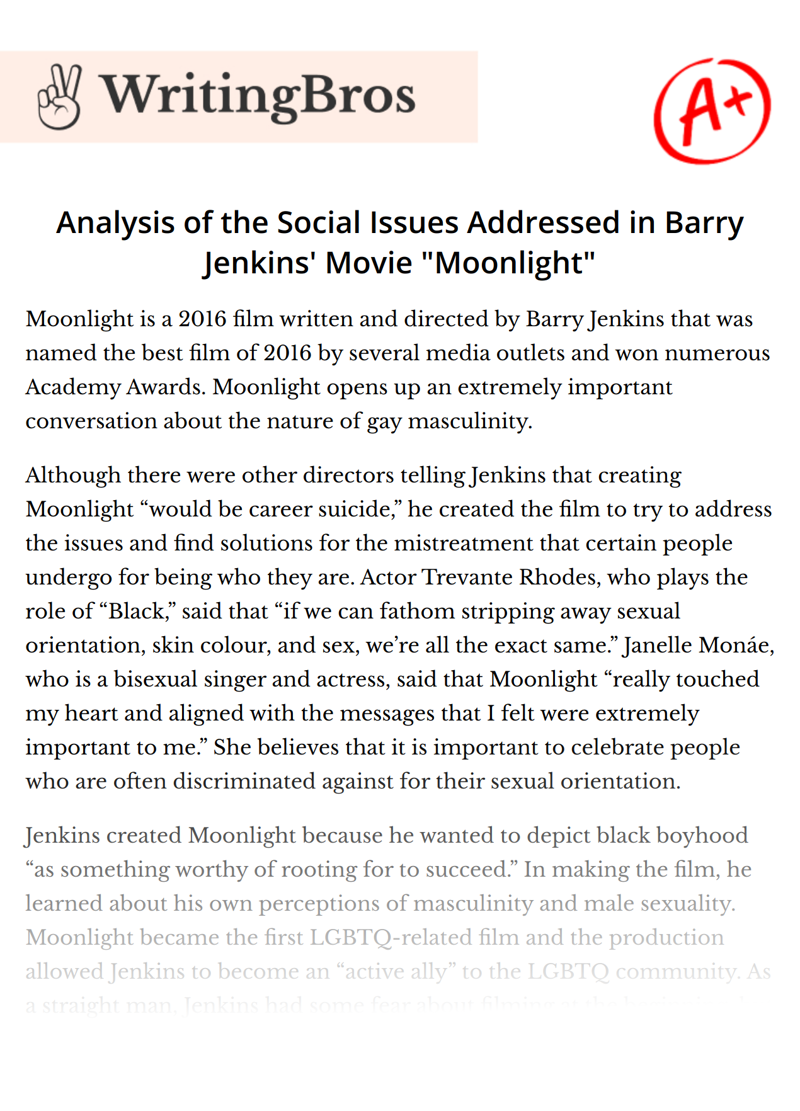Analysis of the Social Issues Addressed in Barry Jenkins' Movie "Moonlight"

Moonlight is a 2016 film written and directed by Barry Jenkins that was named the best film of 2016 by several media outlets and won numerous Academy Awards. Moonlight opens up an extremely important conversation about the nature of gay masculinity.
Although there were other directors telling Jenkins that creating Moonlight “would be career suicide,” he created the film to try to address the issues and find solutions for the mistreatment that certain people undergo for being who they are. Actor Trevante Rhodes, who plays the role of “Black,” said that “if we can fathom stripping away sexual orientation, skin colour, and sex, we’re all the exact same.” Janelle Monáe, who is a bisexual singer and actress, said that Moonlight “really touched my heart and aligned with the messages that I felt were extremely important to me.” She believes that it is important to celebrate people who are often discriminated against for their sexual orientation.
Jenkins created Moonlight because he wanted to depict black boyhood “as something worthy of rooting for to succeed.” In making the film, he learned about his own perceptions of masculinity and male sexuality. Moonlight became the first LGBTQ-related film and the production allowed Jenkins to become an “active ally” to the LGBTQ community. As a straight man, Jenkins had some fear about filming at the beginning, but with the help of Tarell Alvin McCraney, a gay playwright, he felt that he could tell Chiron’s story.
The film takes place in Jenkins’ hometown, Liberty City, which is one of the poorest neighbourhoods in Miami and home to one of the largest concentrations of African Americans in South Florida. Jenkins used his own experience, growing up with a mother who was struggling with an addiction, to produce the film. Jenkins thinks of his life growing up in Miami as very heavy, although it was a beautiful and inspiring place. Jenkins uses bold and expressive colours to create a sense of mood and uses an editing style that is dictated by emotions rather than plot. His work explores the nature of love and this is evident in the screenshots from Moonlight (2016) and If Beale Street Could Talk (2018).
The film’s major theme of masculinity in relation to sexual orientation is exemplified in a five-minute extract in the second chapter where Chiron is beaten up by Kevin. Jenkins and cinematographer James Laxton remind the audience of the negative effects that masculinity can have on people through the elements of cinematography, sound, camera techniques, and mise-en-scène. The extract begins with a circular shot that follows Terrel, a school bully, walking around in a circle. He picks Kevin to punch Chiron to prove his own masculinity. The extract ends with Chiron seeing Kevin as he is escorted by two police officers to a police car while handcuffed. The first act of the extract is the betrayal, where Kevin punches Chiron in the face multiple times. The second act is the breaking point for Chiron. The third act is the revenge scene, where Chiron hits Terrel in the back with a chair.
The first act begins with a menacing circular shot of Terrel, like an animal circling its prey, where the camera focuses solely on Terrel for a long time. The spinning is intended to put the audience “in a state of tension, uncertain as to how the scene will play out.” The non-diegetic sound of the piano creates a dramatic effect, where the pitch slowly decreases. The presence of many students standing around visually displays the social pressure and the power dynamic at hand. According to Jenkins, “the world has literally drilled us down into this standoff” in a place where masculinity has become toxic. After the circular shot, the camera stops moving and there is a close-up of Kevin. There is a shallow depth of field, drawing the attention of the audience to Kevin.
As the camera is placed farther back, Kevin is surrounded by other students, showing that he has support. On the other hand, there is nobody in the background when there is a close-up of Chiron, indicating that he is alone and has to suffer by himself. There is a build up in sound before Kevin punches Chiron for the first time. Cinematographer James Laxton used handheld cameras in this scene because “it felt more immediate and interesting than a designed camera shot.” The use of handheld cameras allows the audience to experience it the same way the actors experience it.
There is a low angle shot of Kevin showing his dominance over Chiron. In this scene, Kevin is wearing a blue shirt with white lines and Chiron is wearing a white shirt with blue lines, showing that Kevin and Chiron complete each other. Instead of the sound of the breeze that the audience hears when Kevin and Chiron are together, there is complete silence after Chiron is knocked out by Kevin, which conveys the death of their friendship. According to Jenkins, this scene is “the clearest performance of the ill effects of masculinity.”
The second act begins with Chiron sitting in the principal’s office. There is a shallow depth of field, as only Chiron is in focus, allowing the audience to get a closer look at him. The camera stays still on Chiron’s face for a long time, as he appears to be isolated. Chiron breaks down for the first time after the principal admonishes him for not pressing charges against the bullies. It offers a glimpse into how excruciating it can be to grow up where masculinity is toxic.
Cite this Essay
To export a reference to this article please select a referencing style below

